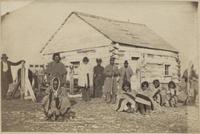Nażicapi (Exile)
The Dakota Exile: Impact and Resistance

"The Sioux Indians of Minnesota must be exterminated or driven forever beyond the borders of the state."
Message of Governor Ramsey to the Legislature of Minnesota: September 9, 1862.
Thursday, March 14, 2013
7:00 p.m.
275 Nicholson Hall
Free and Open to the Public
A Panel Discussion Featuring:
Iyekiyapiwiƞ Darlene St. Clair: Moderator, introduction and context for the exile order.
C̣aƞte Máza Neil McKay: Terminology and impacts of "benevolent" language. How Euro-Minnesotans benefited from the Dakota Exile.
Ahdipiwiƞ Katherine Beane: Impacts of the Exile and the efforts to rescind the exile order.
Ṡiṡokaduta Joe Bendickson: Dakota language revitalization.
Introductions by:
Alejandro Baer, Director, Center for Holocaust and Genocide Studies
Jean O'Brien, Chair, Department of American Indian studies
In May of 1863 1,300 Dakota were loaded onto steamboats and sent to Crow Creek reservation. Crowded onto the boats and weakened by imprisonment, many died on the voyage. The new reservation was desolate and food was scarce. In the first six months at Crow Creek more than 200 Dakota people died, most of them children.
The panel will focus on the exile order, the efforts to rescind the order and its impacts, as well as how Euro-Minnesotans benefited from the Dakota exile.
Sponsored by: The Center for Holocaust and Genocide Studies, the Department of American Indian Studies, Institute for Global Studies and the Human Rights Program.